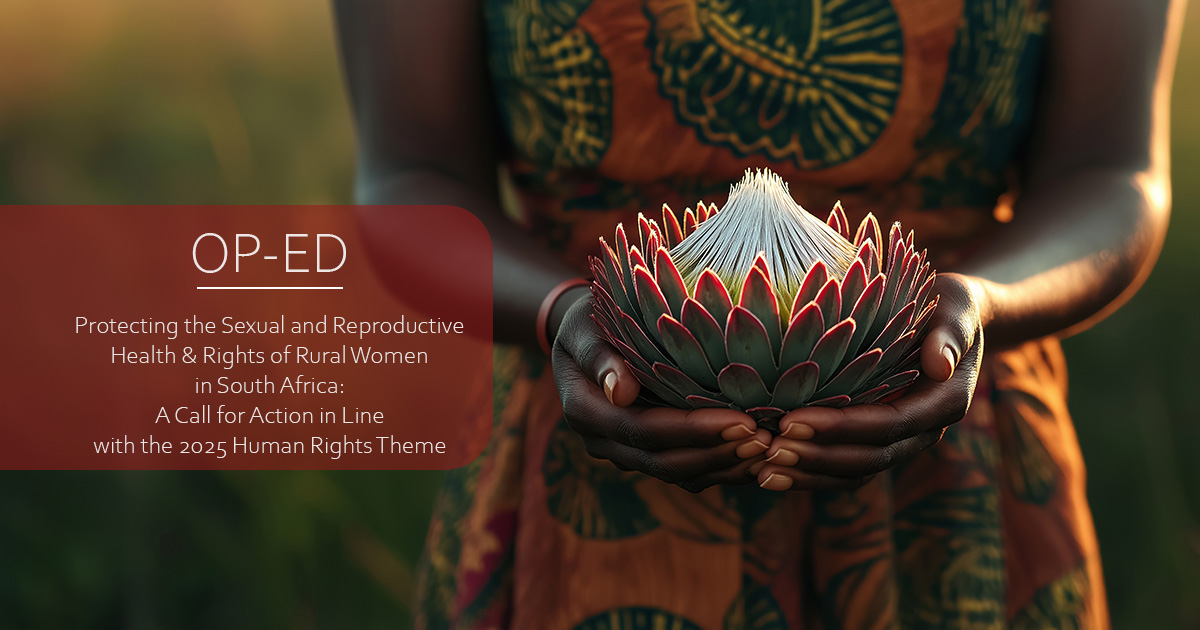Dr Sindiso N. Nkomo and Dr Lydia T. Chibwe
March 21st was declared by the Democratic Government of South Africa as Human Rights Day. The annual commemoration of this day provides an opportunity for taking stock on the progress made in the promotion and protection of human rights in the country. To commemorate this day this year, we believe it is important to focus on the progress made by Government in protecting the sexual and reproductive health (SRHR) and rights of marginalised groups such as rural women.
In rural South Africa, many women continue to face significant challenges in obtaining essential sexual and reproductive health services. This unpleasant reality reveals significant inequalities that jeopardise the nation's dedication to social justice and human rights echoed in South Africa’s 2025 human rights theme: “Deepening a culture of social justice and human rights.” Women residing in rural areas have to travel long distances to access sexual and healthcare facilities that are frequently characterised by insufficient staffing, funding and basic supplies. A study found that rural areas showed the lowest prenatal care coverage at around 89.7%, with an even smaller proportion of women, only 79.7% completing the necessary four antenatal visits. Furthermore, only 84% were provided with HIV testing, highlighting gaps in delivering complete sexual and reproductive healthcare services and commodities they need.
In addition to these physical challenges, most women and girls in rural areas lack awareness of their sexual and reproductive health and rights (SRHR). Despite the legalisation of abortion in South Africa by the Choice on Termination of Pregnancy Act (CTOPA) in 1996, some rural women remain uninformed about its legality and availability. Research undertaken many years post-legalisation indicated that around 32% of women who were interviewed were unaware of the legality of abortion, highlighting how informational gaps perpetuate harmful practices and endanger lives. Young rural women who cannot access comprehensive information and inclusive services, experience higher rates of unplanned and unwanted pregnancies, early and forced marriage and maternal mortality from complications during childbirth or unsafe abortions. This lack of awareness often links with deep-rooted cultural stigmas and misinformation, silencing women from openly discussing or seeking important sexual and reproductive healthcare services and commodities they require.
The catastrophic impacts of HIV/AIDS intensify the accessibility of sexual and reproductive health care. With South Africa being one of the countries globally with the highest HIV prevalence, approximately 30% among women of reproductive age encounters a substantial barrier in delivering integrated reproductive health and HIV/AIDS care, particularly in rural areas where stigma prevails. Young rural women starting their reproductive journeys face significant challenges, encountering obstacles to both HIV and reproductive health services at the same time, which restricts their ability to preserve good health and dignity.
South Africa is one of the countries in Africa with progressive legislation and health policies that are very relevant in furthering the realisation of women’s SRHR. These include among others the Constitution, which is the highest law of the land, the National Health Act (2003), the COTPA, the Criminal Law (Sexual Offences and Related Matters) Amendment Act 32 of 2007 and the National Integrated Sexual and Reproductive Health and Rights Policy ED.1. In addition, the country is obligated under International Law to uphold human rights and dignity. Despite the presence of such progressive laws and policies, implementation is a challenge especially in rural areas and therefore, rural women do not largely benefit from these laws and policies. For instance, refusal to implement provisions on abortion access by healthcare workers for personal reasons, mostly religious and cultural is very common in rural areas. Uneven distribution of abortion services is also a common practice in rural areas. These gaps limit rural women’s ability to exercise their right to reproductive autonomy as provided for in the COTPA.
We believe that to address these challenges, there is a need for comprehensive strategies that are in line with this year’s human rights theme. We also believe that Government must invest in rural healthcare infrastructure and ensure that health facilities are easily accessible for everyone, adequately staffed with skilled personnel and are well resourced. Inequality stubbornly persists in the country. Therefore, for rural communities, especially women, to be able to enjoy their SRHR and report violations, it is important to raise awareness on these rights to dismantle harmful cultural stigmas surrounding SRHR. The government should also invest in capacitating health personnel on adopting human rights-based approaches to service delivery so that they do not deny women access to SRHR services based on their religious and cultural beliefs.
Lastly, addressing SRHR challenges faced by marginalised communities in South Africa such as rural women is not just a matter of providing healthcare services only, but it serves as a test of South Africa’s commitment to meeting its human rights obligations. By putting rural women’s health at the forefront, South Africa can guarantee a future where all women, fully enjoy their right to dignity and reproductive autonomy despite their geographical location or socio-economic status.
